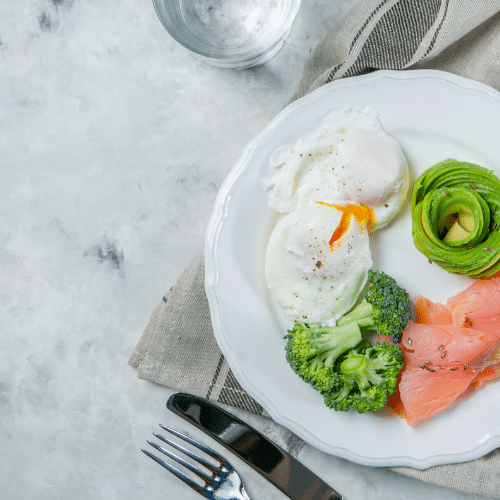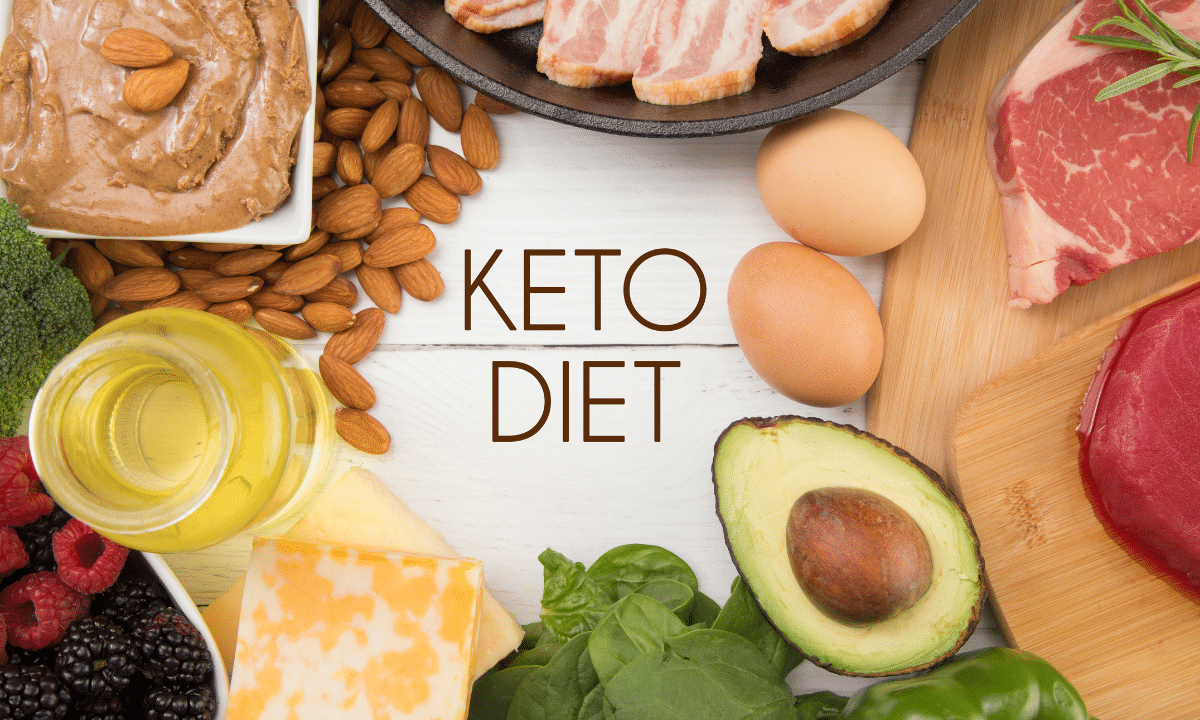Keto Diet for Women Over 40
As you approach your 40s, taking care of your health becomes increasingly important, and for many women, managing their weight becomes a top priority. This concern becomes even more significant during menopause, a phase of life when hormonal changes can make it challenging to maintain a healthy weight.
Table of Contents
ToggleIn this blog post, we will explain how this diet can be beneficial and what women over 40 should take into consideration.
How Keto Diet Can Benefit Women Over 40
- Keto can decrease hunger and appetite.
- It helps with weight loss.
- It has the potential to improve blood glucose levels.
Keto Decreases Appetite and Enhances Satiety
As women enter their 40s, there are many factors that contribute to weight gain, including changes that increase hunger and appetite.
Ketosis, the aim of this diet, results in decreased hunger and enhanced fullness. So, naturally, women following the keto diet find it easier to eat less. In addition, dieters on this plan feel less hungry because the small quantity of carbohydrates consumed can potentially result in decreasing the appetite-stimulating hormones insulin and ghrelin.
Perfect, right?
Weight Loss
Studies suggest that in the short term the keto diet produces rapid weight loss while preserving muscle mass.
This is ideal for women over the age of 40 because muscle loss is one of the reasons middle-age women gain weight easier than they did when they were younger.
Research has also found that in a period shorter than six months, low-calorie, low-carbohydrate diets (like keto) result in greater weight loss than low-fat diets that are also low-calorie and higher in carbohydrates.

At 6, 12, and 24 months, weight loss on a low-carb diet is comparable to other diets.
Considering that different diet approaches can work on short- and long-term weight loss, I advise thinking about your personal preferences and health when selecting an eating style.
Heart Health
Women over 40 often realize how important heart health is as they age. They become more aware of the risks that can come with getting older.
Concerns can arise with the keto diet because of its high fat, which is not generally recommended for heart health. Therefore, keto for women over 40 might be better as a short-term weight loss solution.
Moreover, it’s important to remember that the keto diet is low in fiber, one of the most important components for good cardiovascular health.
However, one report published in the American College of Cardiology Journal concludes that ketone bodies can help protect the heart in people with cardiovascular disease.
Other studies showed significant improvements in triglycerides with low-carbohydrate diets. However, the difference was not significant at 24 months.
The review authors pointed out that while participants followed the keto diet earlier in the studies, adherence to the diet decreased over time. For this reason, it’s difficult to determine the true impact of a keto diet on lipids, cholesterol, and overall heart health.
Blood Glucose
During menopause, there are changes in hormone levels that can affect the way your body uses insulin. This leads your body to produce more insulin, potentially promoting the storage of fat.
The ketogenic diet may help improve glucose levels within a normal range because it lowers carbohydrate intake.
Early research has found that keto diets can help control the level of HbA1c – the glucose traveling in the blood – during a three-month period.
But, keep in mind that there are not enough studies to scientifically conclude that the keto diet is beneficial to decrease insulin resistance.
Warning!
Because of the minimal amount of carbohydrates in the keto diet, people taking medication that lowers blood sugar must consult their healthcare provider before starting on this eating plan.
The role of these medications is to help the body process carbs. But, if there is medication in the body but not enough carbohydrates, the blood sugar can lower to a dangerous level, resulting in a medical emergency with potentially serious health consequences, including death.
Concerns
Digestive Health
Some people on keto experience GI issues, including diarrhea, constipation, vomiting, and abdominal pain.
Dieters following this plan eat a very high amount of fat, and some people will have issues digesting it, especially if they had a moderate intake before starting the diet. The problem would be expected to pass, but this is one of the reasons that keto is not for everybody.
In addition, a 2019 study found that diets that are high in fat can cause inflammation of the GI tract (your intestines), causing a decrease in the good bacteria that are important for your overall health.
Other studies show the opposite, so there is some evidence that this eating plan might have good effects on gut bacteria.
The impact of the keto diet on digestive health could be an issue for women transitioning to menopause, because the hormonal changes associated with this stage of life can cause stomach issues.
Nutrition Deficiencies
As we have seen the keto diet is very restrictive, with a minimal amount of carbohydrates and large amounts of fat. Because of this restriction, it cuts back on foods that are high in fiber, vitamins, and minerals.
As a result, keto followers are at higher risk for nutritional deficiencies. For that reason, it’s likely that you will need to take fiber supplements to relieve constipation and multivitamins with minerals to prevent deficiencies.
Some of the most common nutrient deficiencies include vitamins A, C, and K, and folate.
In the long term, nutritional deficiencies from this eating style can lead to kidney stones, liver disease, and other diseases.
Keto Diet and Social Life
If you’re following a keto diet, social gatherings might be more challenging. On the other hand, because this diet has become so popular, it might be easier to find keto-friendly foods.
Keto Flu
One of the ketogenic diet cons is what’s known as the keto flu, an unpleasant side effect that you might experience when you start due to the low intake of carbohydrates. This can include nausea, vomiting, headaches, fatigue, dizziness, insomnia, difficulty in exercise tolerance, and constipation.
Generally speaking, these symptoms resolve in a few days or weeks and can be minimized by drinking plenty of fluid and consuming enough electrolytes.
Is the Keto Diet Safe for Women Over 40?
Before you commit to a keto diet, consider the concerns described above to determine if this diet is right for you.
Also, if you’re taking medication that lowers your blood glucose, like insulin, it’s best that you follow this diet under the supervision of a registered dietitian and a physician. Your physician will likely adjust your medication to ensure you don’t experience low blood glucose.
Also, this eating plan is not recommended for those with the following chronic diseases:
- Liver disease
- Pancreatic disease
- Thyroid problems
- Eating disorders
In the long term, the keto diet can lead to kidney stones and liver disease, and the risks of consuming such a high-fat diet on heart health are not well studied.
What Is the Keto Diet?
The ketogenic diet (or keto) is a high-fat diet that has moderate protein and is low in carbohydrates. It’s different from other low-carbohydrate diets because of the high-fat content.
A typical breakdown of the keto diet is the following, showing percentages of the total calorie intake.
- Fats 70-80%
- Proteins 10-20%
- Carbohydrates 5-10%
What does this mean?
Think about it like this: if you choose to eat only bacon as your form of fat, you could eat 57 thin slices of bacon a day. You could also eat some protein and a tiny amount of carbs (about one fruit and a medium sweet potato).
Compared to a regular diet, the distribution of macronutrients is significantly in favor of fat. But the number of carbohydrates typically consumed in this diet is very low, normally only from 20 to 50 grams a day.
What Foods Can You Eat in the Keto Diet?
| Meat | Beef, chicken, turkey, veal, pork, buffalo meat, etc |
| Cured meats | Bacon, sausage, ham, etc |
| Fish and seafood | Salmon, tuna, trout, mackerel, shrimp, scallops, octopus, calamari, etc |
| Eggs | Eggs, egg products, and foods made with eggs |
| Cheese | Unprocessed cheese like cheddar, cream, blue, and mozzarella |
| Fat | Butter, cream, ghee |
| Oils | Coconut oil, olive oil, grape-seed oil, and avocado oil |
| Avocados | All types |
| Nuts | Almonds, Brazil nuts, walnuts, flax seeds, pumpkin seeds, and others |
| Seeds | Chia, sesame, and others |
| Vegetables | All low-carb veggies: green leafy vegetables, tomatoes, onions, peppers, etc |
| Condiments | Salt, pepper, herbs, and spices |
What Foods do You Need to Limit?
The most important aspect in this eating plan is to meet the macronutrient goals. Remember that to reach ketosis, you will need to limit sugar and carbohydrates.
| Sugary Foods | Cookies, ice cream, cake, candy, jam, jelly, and other preserves with added sugar, canned fruit packed in sugar, pastries, donuts, milkshakes, and ready-to-eat cereals |
| Sugary beverages | Soda, energy drinks, fruit juice, etc |
| Grains | Bread, rice, pasta, cereal, and all types of grains, including whole grains |
| Fruits | All, except small portions of berries |
| Beans and Legumes | Black beans, kidney beans, lentils, peas, chickpeas, and all beans and legumes. |
| Root vegetables | Potatoes, malanga, sweet potatoes, carrots, and others |
| Condiments with added sugar | Barbecue sauce, ketchup, honey mustard, teriyaki sauce, etc |
| Alcohol | Beer, wine, mixed drinks |
Sample Meal Plan
Breakfast
- Avocado and eggs
- Bacon and cheese egg omelet
Lunch
- Cobb salad
- Shrimp lettuce wrap
Dinner

My Personal Opinion as a Nutrition Expert
Overall, as a doctor in clinical nutrition, I believe in achieving a well-balanced and healthy diet in the long term. However, I can see how the keto diet can help many reach their goals.
It should be noted, though, that this should be a short-term solution with a plan to achieve a better nutrition balance over time.
If you have more questions about the keto diet’s pros and cons and whether or not it is a good choice for you, check with your health care professional.
A registered dietitian can also create a healthy eating plan personalized to your needs. Just select a healthcare professional who aligns with your preferences and goals.
To explore other diet options, check out some of our other blog posts:
Intermittent Fasting for Women Over 40

Dr. Su-Nui Escobar, a Registered Dietitian/Nutritionist in Miami, FL, is dedicated to empowering women in perimenopause and menopause to live healthier, more satisfying lives.
With a doctorate in clinical nutrition from the University of North Florida, she has expertise in menopause and weight loss, including the unique challenges faced by those on weight loss medications.
Su-Nui’s passion for her field is evident in her previous role as the Academy of Nutrition and Dietetics spokesperson.


